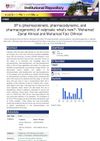 47 citations,
December 2002 in “Journal of Neurochemistry”
47 citations,
December 2002 in “Journal of Neurochemistry” Progesterone boosts alcohol's effect on brain, finasteride counters it.
18 citations,
August 2011 in “Medical Hypotheses” Physical inactivity is a primary cause of many human illnesses.
 36 citations,
March 2002 in “Journal of Biological Chemistry”
36 citations,
March 2002 in “Journal of Biological Chemistry” Food deprivation increases MST enzyme in the brain, possibly affecting energy balance.
 8 citations,
May 2017 in “IUBMB life”
8 citations,
May 2017 in “IUBMB life” Astrotactin proteins are important for brain and skin development and are linked to several neurodevelopmental disorders.
 10 citations,
December 2017 in “Chemosphere”
10 citations,
December 2017 in “Chemosphere” Bisphenol-A (BPA) increases connections between brain cells and boosts their activity, but it blocks the effects of a male hormone on brain cell plasticity.
 September 2018 in “Value in Health”
September 2018 in “Value in Health” Kids from areas with more high school dropouts have higher rates of brain injuries.
 April 2023 in “Journal of Investigative Dermatology”
April 2023 in “Journal of Investigative Dermatology” Psoriasis patients did not show more brain atrophy or small vessel disease than controls, but longer psoriasis duration was linked to more brain atrophy.
 11 citations,
September 2020 in “OncoTargets and Therapy”
11 citations,
September 2020 in “OncoTargets and Therapy” Dihydrotestosterone increases growth and spread of human brain cancer cells, and blocking its formation might help treat this cancer.
 8 citations,
July 2022 in “BMC neuroscience”
8 citations,
July 2022 in “BMC neuroscience” Transplanted hair follicle stem cells improved brain function and reduced damage after a stroke in rats.
 June 2023 in “International Journal of Pharmaceuticals Nutraceuticals and Cosmetic Science”
June 2023 in “International Journal of Pharmaceuticals Nutraceuticals and Cosmetic Science” New information shows Valproate may protect the brain and reduce breathing failure risk but can cause liver damage and other side effects, with genetics affecting dosage needs.
 12 citations,
June 2019 in “Psychoneuroendocrinology”
12 citations,
June 2019 in “Psychoneuroendocrinology” Allopregnanolone is needed for certain brain processing issues caused by D1 dopamine receptor activation.
 May 2024 in “Scientific Reports”
May 2024 in “Scientific Reports” Androgen receptors in the mouse brain may explain cognitive and mood changes in prostate cancer treatment.
 December 2020 in “Current Sexual Health Reports”
December 2020 in “Current Sexual Health Reports” Finasteride can have lasting negative effects on brain function and behavior by disrupting neurosteroid production.
 February 2023 in “Frontiers in Endocrinology”
February 2023 in “Frontiers in Endocrinology” Too much male hormone in mothers can negatively affect the sexual behavior of both male and female baby mice.
 March 2024 in “The journal of sexual medicine”
March 2024 in “The journal of sexual medicine” Finasteride's negative effects on brain tissue in male rats may be reversible after stopping the drug.
 12 citations,
March 2018 in “Analytical chemistry”
12 citations,
March 2018 in “Analytical chemistry” Researchers created a new method to measure brain steroids, finding higher levels of certain steroids and changes due to a drug.
 September 2013 in “Science”
September 2013 in “Science” Certain astrocytes can protect the brain and improve recovery after a stroke, and a hair loss drug might reduce cancer spread.
Finasteride may help treat childhood brain tumors by activating certain genes.
 123 citations,
December 2015 in “Journal of Neuroendocrinology”
123 citations,
December 2015 in “Journal of Neuroendocrinology” New targets for making and using brain-synthesized steroids could lead to better treatments for brain disorders and alcoholism.
 6 citations,
January 2015 in “Evidence-based Complementary and Alternative Medicine”
6 citations,
January 2015 in “Evidence-based Complementary and Alternative Medicine” Saw palmetto extract may help treat brain tumors by blocking a specific growth signal and blood vessel formation.
1 citations,
July 2020 in “Acta Neuropsychologica” Valproic acid effectively reduces aggressive and impulsive behaviors in brain injury patients with acceptable side effects.

Hair loss due to a repaired brain bulge was successfully treated using a tissue expansion technique.
 October 2023 in “IBRO neuroscience reports”
October 2023 in “IBRO neuroscience reports” Rat hair follicle stem cells have functional oxytocin receptors, useful for studying neuropsychiatric disorders.
 1 citations,
December 2022 in “Biomolecules & therapeutics”
1 citations,
December 2022 in “Biomolecules & therapeutics” Minoxidil may help reduce aging effects in brain cells.
 2 citations,
February 2003 in “Annals of Neurology”
2 citations,
February 2003 in “Annals of Neurology” Neuroimaging suggests that treatments targeting brain steroids could help control epilepsy, especially types linked to the menstrual cycle.
 34 citations,
December 2015 in “Neuroscience & Biobehavioral Reviews”
34 citations,
December 2015 in “Neuroscience & Biobehavioral Reviews” Some hormone-related drugs may protect brain cells in Parkinson's disease differently in men and women.
 22 citations,
January 2008 in “Physiological Research”
22 citations,
January 2008 in “Physiological Research” Steroid sulfatase is important for activating hormones that affect memory, brain function, and certain diseases, and could be a target for treating hormone-related disorders.
18 citations,
September 2021 in “Journal of Neuroendocrinology” Neurosteroids can influence behavior by modulating brain inhibition, with potential for treating psychiatric disorders.
 2 citations,
January 2011 in “Andrologia”
2 citations,
January 2011 in “Andrologia” Flutamide and a new synthetic steroid affected brain and prostate chemicals and showed potential for treating androgen-related conditions and epilepsy.
 3 citations,
September 2018 in “Journal of Biomaterials Science, Polymer Edition”
3 citations,
September 2018 in “Journal of Biomaterials Science, Polymer Edition” Different materials affect the growth of brain cells and fibroblasts, with matrigel being best for brain cell growth.


























